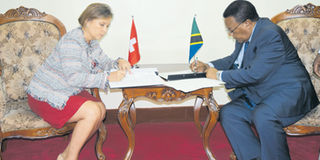TZ, Swiss govt chart new diplomatic path

Swiss ambassador to Tanzania, Ms Florence Tinguely Mattli and Foreign Affairs minister Augustine Mahiga sign a Memorandum of Understanding (MoU) for cooperation in the fight against economic crimes. PHOTO| COURTESY OF THE SWISS EMBASSY AND STATE HOUSE
What you need to know:
- But that relationship has for years now been facing a major hurdle in the fight against economic crime with Tanzania claiming an increasing number of its citizen were using banks in the European nation to stash away billions of shillings in stolen funds.
Dar es Salaam. On October 21, 1966, Tanzania and Switzerland entered into a partnership to help each other create a juster society, support economic growth and reduce poverty.
But that relationship has for years now been facing a major hurdle in the fight against economic crime with Tanzania claiming an increasing number of its citizen were using banks in the European nation to stash away billions of shillings in stolen funds.
From politicians and senior government officials to well-connected individuals and private business players, many Tanzanians have apparently joined the global fray to take advantage of the Swiss banking secrecy loophole to hide ‘black money’.
That secrecy, which dates back to a 1934 law that made it a crime to reveal a client’s identity, has helped to turn Switzerland into the world’s biggest tax haven and asset management centre.
But as Tanzania and Switzerland celebrated the 50th anniversary of bilateral ties last week, the two nations signed a Memorandum of Understanding (MoU) in a fresh bid to tackle tax evasion among other economic crimes.
This will see the two sharing intelligence at a time the global campaign against economic crime gathers momentum.
A new chapter
In an exclusive interview with The Citizen, the Swiss ambassador to Tanzania, Ms Florence Tinguely Mattli, described the signing of the agreement as a new chapter in relations between the two countries.
“Switzerland is ready to support Tanzania’s efforts to track down ill-gotten wealth hidden,” she said, “The Memorandum of Understanding (MoU) will strengthen the war against corruption.”
In a veiled reference to the bad reputation Switzerland has earned globally as a tax haven of choice for the world’s most corrupt, Ms Mattli said her country had no interest in illegal money.
She, however, noted that policies governing her country prioritised the preservation of integrity and confidence of the financial sector.
Foreign Affairs and International Cooperation minister Augustine Mahiga described the agreement as a milestone in the country’s efforts to nail the culprits the government has been chasing for years now.
Previously, Tanzanian authorities were forced into a wild-geese-chase, thanks to the legal barrier that shielded Swiss bank account holders against scrutiny.
“With the signing of this MoU, we will easily access information on locals who have deposited money with Swiss banks,” he said.
But under the new deal, the Swiss ambassador said such information would only be released upon request by the country, unlike in some cases where private investigations were the sources, albeit revealing figures without names.
In 2013, Ms Mattli’s predecessor, former Swiss ambassador to Tanzania Olivier Chave was quoted as saying Tanzania had not presented official requests for assistance in investigating locals with offshore accounts. That raised questions on the country’s political will to go after black money with the opposition leading the push for action.
That was after at least 17 prominent individuals in political and business circles were fingered in a report by Swiss National Bank (SNB)-the Central Bank of Switzerland that revealed hidden “loot” amounting to $196.87 million.
The government established a committee to trace the owners of the $196.87 million allegedly stashed in Swiss banks by Tanzanians, following a private motion tabled by Mr Zitto Kabwe (Kigoma North – Chadema).
Pressure for the Tanzanian authorities to recover ‘illicit money’ supposedly secreted in accounts in Switzerland has only increased over the years.
Stakes were raised higher early this years after the release of the Panama Papers which revealed that Tanzania had 45 businessmen with offshore accounts in territories that are known as tax havens. The list has bank account holders who gave Tanzania as their home country.
It was said to include names of well-known businessmen and some have been or continue to be politicians.
It is not illegal to own an offshore bank account but an approval is required from the central bank before any Tanzanian residing in the country opens such an account.
According to the International Consortium of Investigative Journalists (ICIJ) which conducted the investigations, such offshore accounts have become popular for rich individuals and multinational corporations seeking to musk their operations while criminal cartels have also preferred the same tax havens to launder their proceeds of crime, including drugs and arms dealing.
The same organsiation, however, cautions that some of the businesses revealed may be valid operations whose owners merely seek to hide their identities by using phantom names of directors and nominee shareholders in their opaque companies.
But it says such information would help expose secret dealings of those who keep their monies in offshore accounts, usually in small countries known to shield business operations from tax responsibilities. For international authorities, Switzerland is one of the main targets.
Switzerland relaxed its bank secrecy law in 2009. But critics say the changes in many tax havens including the European nation have not gone far enough.
In 2009, Switzerland said it would make information on bank clients available - but only if it received detailed requests on individual cases from other countries. It still does not allow the automatic sharing of account information and has been pushing for a tax amnesty for its existing clients.
Switzerland’s “widespread involvement in the administration and use of trusts, foundations and offshore companies remain a major barrier to tackling tax evasion and illicit financial flows”, the Tax Justice Network said in a report that ranked it the world leader in financial opacity in 2011.
Secrecy was enshrined in law in 1934 to prevent Jewish assets deposited in Switzerland from being investigated by Nazi Germany.
Tanzania now joins the countries like Britain and Austria that have also gone ahead with tax agreements with Switzerland in what could be starting point in a push for automatic exchange of information.




